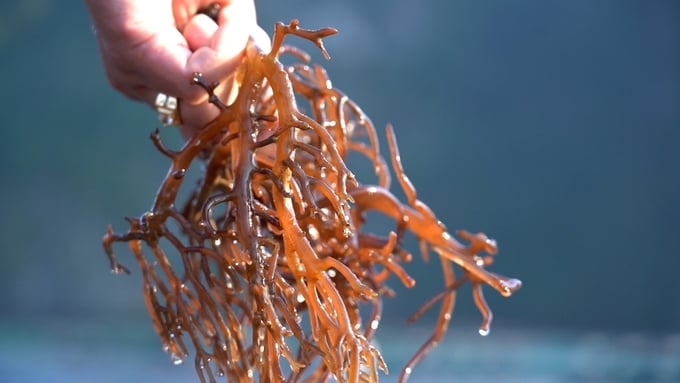June 16, 2025 | 07:40 GMT +7
June 16, 2025 | 07:40 GMT +7
Hotline: 0913.378.918
June 16, 2025 | 07:40 GMT +7
Hotline: 0913.378.918
The seaweed industry in Vietnam has substantial potential for growth. Nevertheless, the current seaweed cultivation area is still restricted and does not yet match its inherent potential.
The entire seaweed cultivation area in Vietnam is expected to reach nearly 17,000 hectares by 2023, with a production volume of approximately 150,000 tons, according to the Department of Fisheries (under the Ministry of Agriculture and Rural Development). This is comparatively small in comparison to the annual aquaculture production of 5.4 million tons, suggesting that there is significant potential for development in the seaweed sector.

According to Mr. Dinh Xuan Lap, Deputy Director of the International Cooperation Center for Sustainable Aquaculture and Fisheries Exploitation (ICAFIS), seaweed holds tremendous value in both economic and environmental aspects. Photo: Hong Tham.
Numerous obstacles confront the seaweed industry. One significant concern is the diminishing quality of seaweed varieties as a result of genetic degradation, which reduces the extractable nutrient content. Furthermore, the impacts of climate change, marine pollution, and natural disasters, as well as competition for production space with other economic sectors, present substantial challenges. Vietnam's seaweed competitiveness in the global market is impacted by these factors, which not only hinder the expansion of agricultural areas but also hit productivity and product quality.
The seaweed industry has the potential to grow significantly, despite the obstacles it faces. The current value of the global seaweed market is estimated to be between USD 16 and USD 20 billion, with an average annual development rate of approximately 10%. Vietnam has the opportunity to capitalize on its assets by capitalizing on the growing demand for eco-friendly products, renewable energy, and green cuisine. In the green transition era, seaweed is celebrated as a "treasure" for its economic value and significant contribution to sustainable development and environmental protection.
Seaweed is of significant economic and environmental value, as stated by Mr. Dinh Xuan Lap, the Deputy Director of the International Cooperation Center for Sustainable Aquaculture and Fisheries Exploitation (ICAFIS).
Ocean acidification, which is becoming more critical as a result of climate change, is a critical environmental issue that seaweed plays a crucial role in neutralizing. It also serves as reproductive and development grounds for a variety of aquatic species, providing them with habitats.

Effectively harnessing the seaweed industry not only brings economic benefits but also plays a significant role in environmental protection. Photo: Hong Tham.
It is worth noting that seaweed has the capacity to absorb 2–5 times more carbon greenhouse gases than terrestrial forests in the same area, according to research. By establishing a substantial carbon sink in the ocean, certain wide-canopied seaweed species with extensive coverage can absorb up to 20 times more carbon, thereby contributing to a green planet.
Seaweed's economic potential has not yet been completely realized. Nevertheless, it offers a discipline that has the potential to generate substantial economic benefits, particularly for coastal fishery communities. It is well-suited for small-scale households due to its minimal investment cost, which promotes sustainable livelihoods for fishermen, particularly those in difficult circumstances.
Additionally, seaweed may be utilized as a sustenance for marine animals or cultivated in conjunction with other aquatic species, including fish and oysters. This dual-purpose agricultural approach alleviates the burden of natural exploitation.
Furthermore, the nutritional and medicinal properties of seaweed are noteworthy. It is enriched with 15 amino acids, calcium, and vitamins A, B, and E, in addition to high levels of collagen. In the food industry and medicine, these components are highly regarded.Seaweed is now considered a delicacy, as modern consumer trends prioritize health-conscious and nutritious products. Mr. Lap underscored that seaweed, which is regarded as the "bird's nest of the sea" due to its 15 amino acids and distinctive characteristics, has the potential to generate extraordinary economic benefits when properly employed.
Translated by Linh Linh
/2025/06/12/3721-2-202745_83.jpg)
(VAN) TH made an impression at Seoul Food 2025 with its line of natural beverages, paving the way for Vietnamese food products to enter the South Korean market.

(VAN) Soc Trang's success in rice exports stems from a strategy of developing fragrant and specialty rice cultivation areas and standardizing production toward low-emission practices.
/2025/06/11/1311-5-120811_839.jpg)
(VAN) The pig farming industry is facing the challenge of comprehensive restructuring to meet requirements for quality, safety, traceability, and market expansion both domestically and for export.

(VAN) Vietnam considers participating in ALGROALBA in order to expand agricultural production, coordinate the assessment and effective exploitation potential land.
/2025/06/05/5314-1-184727_407.jpg)
(VAN) From seemingly worthless fish scales and skin, enzymes and lactic ferments can transform by-products into peptides, opening a sustainable, effective business direction and elevating Vietnamese seafood.

(VAN) TTC AgriS and IFC signed a strategic partnership to develop a sustainable agricultural value chain, aiming to achieve the Net Zero target by 2035.

(VAN) Seafood by-products are opening a new path, combining green growth and technological innovation to enhance the industry's value.